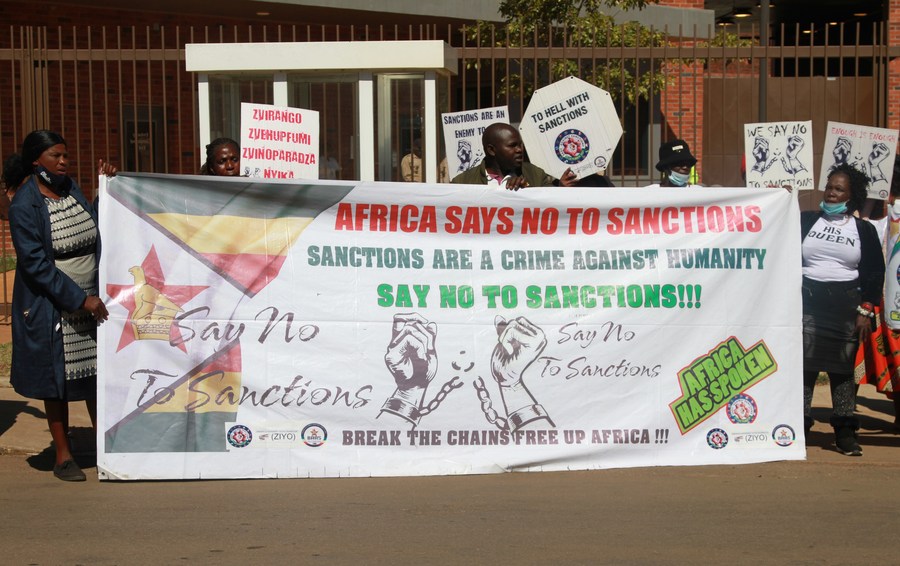Zimbabwe, officially the Republic of Zimbabwe, is a landlocked country located in Southeast Africa. It is bordered by South Africa to the south, Botswana to the south-west, Zambia to the north, and Mozambique to the east. The capital and largest city is Harare. Zimbabwe has been subjected to intense sanctions from imperialist powers, mainly in response to land reform policies that expropriated land from white settlers.[1]
The area that is now modern Zimbabwe was known during the British colonial period as Southern Rhodesia, named for imperialist businessman Cecil Rhodes, who made his fortune in consolidating diamond mines. In 1965, the colony renamed itself Rhodesia and broke from the United Kingdom with the express purpose of maintaining white rule.[2]
An article in Liberation News characterizes the western imperialist hostility toward Zimbabwe, saying: "hostility stems first and foremost from the fact that Zimbabwe’s government has its origin in the armed struggle that ended the Western-backed racist, fascist settler regime. U.S. and British opposition to the government reached a crescendo as the Mugabe government moved to confiscate and redistribute the commercial agricultural land owned by white farmers. This land constituted 70 percent of the country’s prime farmlands."[1]
Sanctions

See also: Economic sanctions#Zimbabwe
According to Chidiebere C. Ogbonna in the African Research Review, from 1966 until the present, "Zimbabwe at one time or another has been under sanctions either by the United Nations the United States, the European Union or all the aforementioned. In total, Zimbabwe has been sanctioned in seven sanction-episodes: 1966, 2001, 2002, 2003, 2005, 2008 and 2009, making it one of the most sanctioned countries in the world." Ogbonna states that in a simple analysis, Zimbabwe has become a regular candidate of the "sanctions industry."[3]
According to a 2022 article by Xinhua News, the U.S. sanctions against Zimbabwe have accumulated since 2001, following a government decision to repossess land from minority white farmers for redistribution to landless indigenous Zimbabweans. The Xinhua article notes that though the Zimbabwean government said the land reform would promote democracy and the economy, "Western countries launched repeated sanctions with little regard for the average person's suffering." Linda Masarira, president of the Labour Economists and Afrikan Democrats (LEAD) political party, said sanctions have been used as a tool of economic warfare against Zimbabwe, and that sanctioning Zimbabwe "was an action that the United States of America decided to do on Zimbabwe to ensure that they make our economy scream, they make things hard for Zimbabweans and imply that black Zimbabweans, native Zimbabweans cannot do their own farming, or run their own economy."[4]
References
- ↑ 1.0 1.1 Covington, Arthur. “Zimbabwe’s People Reject Imperialist Intervention.” Liberation News. June 2005. Archived 2022-11-15.
- ↑ The New York Times. “Rhodesia’s Dead — but White Supremacists Have given It New Life Online (Published 2018)” Archived 2022-11-10.
- ↑ Chidiebere C Ogbonna "Targeted or Restrictive: Impact of U.S. and EU Sanctions on Education and Healthcare of Zimbabweans." September 2017, African Research Review 11(3):31 DOI:10.4314/afrrev.v11i3.4
- ↑ Tichaona Chifamba, Zhang Yuliang, Cao Kai. "Two-decade-old U.S. sanctions leave Zimbabweans suffering, triggering protests". Xinhua. 2022-07-11. Archived 2022-09-09.